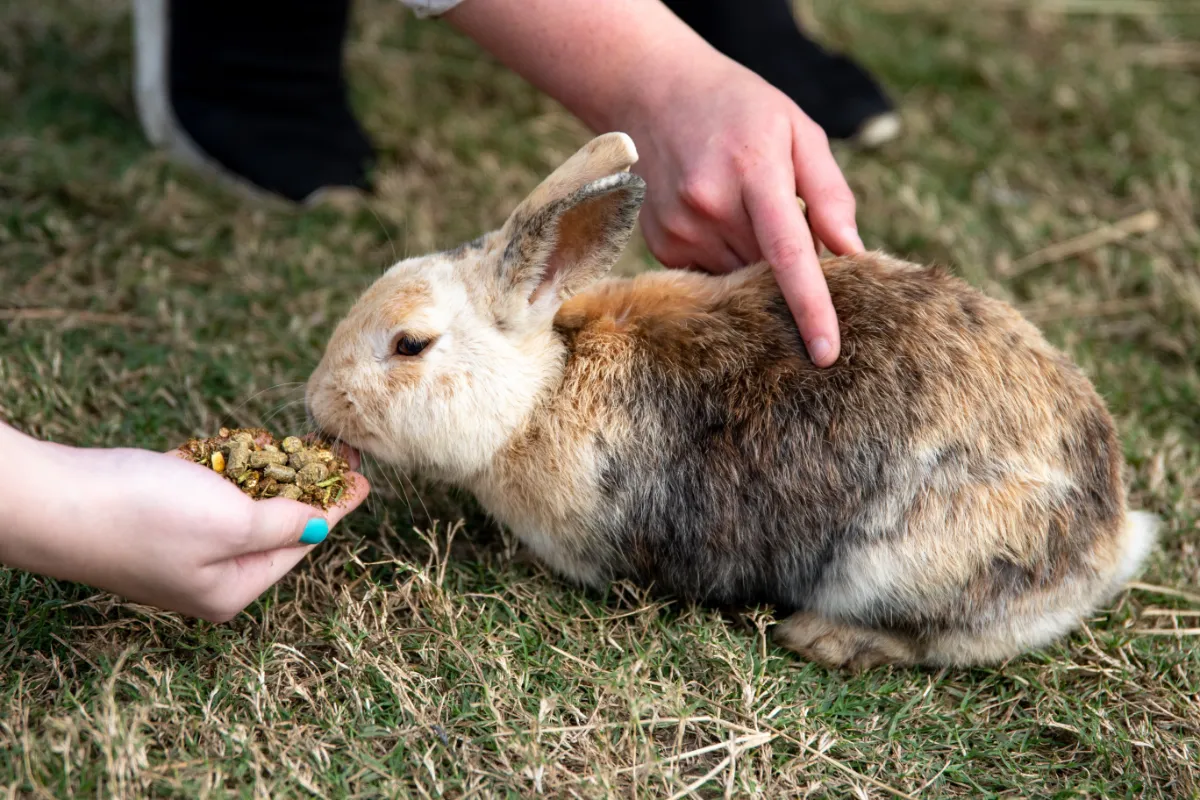Are your furry friend’s ears causing them discomfort? Don’t fret! You can treat your rabbit’s ear infection right at home.
In this article, we’ll guide you through the process of understanding and addressing rabbit ear infections. From recognizing the signs to providing natural remedies and over-the-counter treatments, we’ve got you covered.
Plus, we’ll share tips on preventing future infections and knowing when it’s time to seek veterinary care.
Get ready to provide comfort and relief for your beloved bunny!
In This Article
- 1 Key Takeaways
- 2 Understanding Rabbit Ear Infections
- 3 Signs and Symptoms of Rabbit Ear Infections
- 4 Cleaning Your Rabbit’s Ears
- 5 Natural Remedies for Rabbit Ear Infections
- 6 Over-the-Counter Treatments for Rabbit Ear Infections
- 7 Preventing Rabbit Ear Infections
- 8 When to Seek Veterinary Care for Rabbit Ear Infections
- 9 Tips for Providing Comfort to a Rabbit With an Ear Infection
- 10 Frequently Asked Questions
- 10.1 Can I Use Regular Ear Drops for Humans on My Rabbit’s Ear Infection?
- 10.2 How Long Does It Take for a Rabbit’s Ear Infection to Heal With Natural Remedies?
- 10.3 Is It Safe to Use Hydrogen Peroxide to Clean My Rabbit’s Infected Ears?
- 10.4 Can a Rabbit Ear Infection Spread to Other Pets in the House?
- 10.5 What Should I Do if My Rabbit’s Ear Infection Keeps Coming Back?
- 11 Conclusion
Key Takeaways
- Regularly check your rabbit’s ears for signs of infection such as redness, swelling, discharge, or a foul odor.
- Seek veterinary care for a proper diagnosis and guidance.
- Use natural remedies such as chamomile oil or apple cider vinegar after consulting a veterinarian.
- Maintain good hygiene by regularly cleaning your rabbit’s ears and their living environment.
Understanding Rabbit Ear Infections
Do you want to learn more about understanding rabbit ear infections?
It’s essential to have a good understanding of the causes of rabbit ear infections, especially if you’re serving as a caretaker for these adorable creatures.
While any rabbit can develop an ear infection, certain breeds are more prone to this condition. Common breeds that are susceptible to ear infections include the Lop, Rex, and Mini Rex.
There are various causes of rabbit ear infections, including ear mites, bacterial or fungal infections, and allergies.
It’s crucial to regularly check your rabbit’s ears for any signs of infection, such as redness, swelling, discharge, or a foul odor.
Signs and Symptoms of Rabbit Ear Infections
You should be aware of the three main signs and symptoms of rabbit ear infections: redness, discharge, and foul odor. These indicators can help you identify if your rabbit is suffering from an ear infection.
Common causes of rabbit ear infections include mites, bacteria, and yeast. If you notice any of these signs, it’s important to seek treatment options to alleviate your rabbit’s discomfort and prevent further complications.
Treatment options for rabbit ear infections typically include cleaning the affected area with a gentle ear cleaner, administering prescribed medications, and providing a clean and hygienic living environment for your rabbit.
It’s crucial to consult with a veterinarian for a proper diagnosis and guidance on the best course of action for your furry friend. By being vigilant and proactive, you can help your rabbit overcome ear infections and improve their overall well-being.
Cleaning Your Rabbit’s Ears
To properly clean your rabbit’s ears, gently use a cotton swab and coconut oil, ensuring that you don’t insert it too deep or cause any discomfort. Cleaning your rabbit’s ears regularly is essential for their overall health and well-being.
Here are some home remedies and ear cleaning techniques that can help:
- Use a cotton swab dipped in coconut oil to clean the outer part of the ear.
- Avoid using water or any harsh chemicals, as this can irritate the rabbit’s delicate ears.
- Be gentle and patient while cleaning, as rabbits have sensitive ears.
- Check for any signs of infection, such as redness, discharge, or a foul smell.
- If you notice any abnormalities or if your rabbit shows signs of discomfort, consult a veterinarian for further guidance.
Natural Remedies for Rabbit Ear Infections
If your rabbit is suffering from an ear infection, consider using chamomile oil or apple cider vinegar as natural remedies to alleviate the discomfort.
Herbal remedies have been used for centuries to treat various ailments, and they can also be beneficial for your furry friend. Chamomile oil has soothing properties and can help reduce inflammation in the ears. Simply dilute a few drops of chamomile oil in a carrier oil, such as coconut oil, and gently apply it to the affected area using a cotton ball.
Apple cider vinegar is another effective homemade solution. Mix equal parts of apple cider vinegar and water, and use a dropper to apply a few drops into the ear canal. Gently massage the base of the ear to help the solution penetrate.
However, it’s important to consult with a veterinarian before trying any herbal remedies to ensure they’re safe for your rabbit.
Over-the-Counter Treatments for Rabbit Ear Infections
Consider using over-the-counter ear drops to treat your rabbit’s ear infection, as they can provide relief and help clear up the infection. Ear infections are common in rabbits and can cause discomfort and pain. While there are alternative remedies available, over-the-counter ear drops are a convenient and effective option for treating this condition.
Here are some important points to consider:
- Choose ear drops specifically designed for rabbits, as human ear drops may contain ingredients that could be harmful to your pet.
- Follow the instructions carefully and administer the drops as directed.
- Monitor your rabbit’s response to the treatment and consult a veterinarian if there’s no improvement or if the infection worsens.
- Be aware of potential side effects such as irritation or allergic reactions, and discontinue use if any adverse reactions occur.
- Remember to maintain good hygiene by regularly cleaning your rabbit’s ears and keeping their living environment clean.
Preventing Rabbit Ear Infections
To prevent rabbit ear infections, you should regularly clean your pet’s ears and keep their living environment clean. Rabbit ear hygiene is essential for maintaining the health and well-being of your furry friend.
Cleaning your rabbit’s ears should be done gently and with caution. Use a damp cloth or a specially formulated ear cleaner for rabbits to remove any dirt or debris. It’s important to avoid using cotton swabs or inserting anything into their ears, as this can cause injury.
Additionally, maintaining a clean living environment for your rabbit is crucial. Ensure that their cage or enclosure is kept free from excessive moisture, dust, and dirt, as these are common causes of rabbit ear infections.
When to Seek Veterinary Care for Rabbit Ear Infections
You should always promptly seek veterinary care if your rabbit shows persistent symptoms of ear infection, such as frequent scratching or head shaking. While home remedies may provide temporary relief, it’s crucial to consult a veterinarian for proper diagnosis and treatment.
Here are some reasons why veterinary care is essential for rabbit ear infections:
- Accurate Diagnosis: A veterinarian can accurately diagnose the underlying cause of the ear infection, ensuring appropriate treatment.
- Effective Treatment: Veterinary care ensures that your rabbit receives the most effective treatment, including prescribed medication and cleaning solutions.
- Preventing Complications: Professional care minimizes the risk of complications such as secondary infections or hearing loss.
- Expert Advice: Veterinarians can provide valuable advice on preventive measures and proper ear hygiene for your rabbit.
- Peace of Mind: Seeking veterinary care ensures you’re doing everything possible to help your rabbit recover and offers peace of mind knowing you’re providing the best care.
Tips for Providing Comfort to a Rabbit With an Ear Infection
Sometimes, try gently massaging your rabbit’s ears with your fingertips and softly speaking to them in order to provide comfort and reassurance during their ear infection.
Rabbits with ear infections can experience discomfort and anxiety, and providing relief through soothing remedies is essential. Massaging the ears can help increase blood flow and promote healing. Be sure to use gentle, circular motions and avoid applying excessive pressure.
Additionally, softly speaking to your rabbit can help them feel calm and secure during this challenging time. Remember to use a soothing tone and offer words of reassurance.
Alongside these comforting techniques, it’s crucial to follow the veterinarian’s prescribed treatment plan for your rabbit’s ear infection. By combining medical treatment with gentle massage and comforting words, you can help your rabbit find relief and support their healing process.
Frequently Asked Questions
Can I Use Regular Ear Drops for Humans on My Rabbit’s Ear Infection?
You shouldn’t use regular ear drops for humans on your rabbit’s ear infection. It’s important to consult a veterinarian for proper treatment. Other potential home remedies for treating rabbit ear infections include cleaning the ears and using natural ear drops specifically made for rabbits.
How Long Does It Take for a Rabbit’s Ear Infection to Heal With Natural Remedies?
To heal a rabbit’s ear infection with natural remedies, it can take some time. However, by practicing prevention measures and using soothing remedies, such as warm chamomile tea, you can help speed up the healing process.
Is It Safe to Use Hydrogen Peroxide to Clean My Rabbit’s Infected Ears?
Using hydrogen peroxide for your rabbit’s infected ears can have pros and cons. It may help clean the infection, but it can also be irritating. Consider alternative home remedies like white vinegar or chamomile tea.
Can a Rabbit Ear Infection Spread to Other Pets in the House?
A rabbit ear infection, if left untreated, can potentially spread to other pets in the house. It is important to be aware of the signs of a rabbit ear infection and take preventive measures to protect your other pets.
What Should I Do if My Rabbit’s Ear Infection Keeps Coming Back?
If your rabbit’s ear infection keeps coming back, it’s important to take preventative measures. Regularly clean their ears, maintain good hygiene, and consult with a veterinarian for managing chronic ear infections.
Conclusion
In conclusion, treating a rabbit ear infection at home can be done with proper care and attention. Regularly cleaning your rabbit’s ears and using natural remedies or over-the-counter treatments can help alleviate the symptoms and promote healing.
However, it’s important to be aware of when to seek veterinary care if the infection persists or worsens. For example, a case study involving a rabbit named Coco showed significant improvement in her ear infection after using a combination of natural remedies and veterinary prescribed medication.
Remember to prioritize your rabbit’s comfort and well-being when treating an ear infection.





